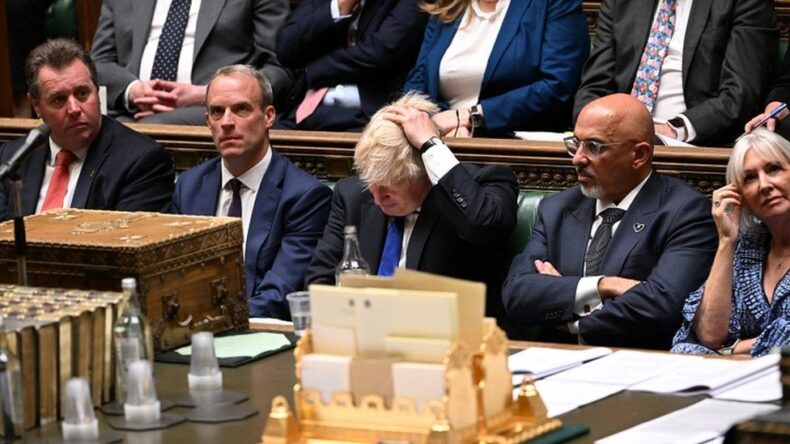The departure of Boris Johnson as head of the Conservative Party has made room for the selection of a new prime minister for Great Britain.
Along with trade minister Penny Mordaunt and foreign secretary Liz Truss, Indian-born Rishi Sunak is a leading contender. Who else is competing?
Boris Johnson’s future is in danger because some of his own lawmakers have turned against him after hearing about lockdown-invading parties at his official home.
As Johnson said in front of No. 10 Downing Street, “It is clear that the parliamentary Conservative party wants a new leader and, therefore, a new prime minister.”
There will now be a leadership election to choose the next Tory leader and PM. We consider the leading candidates.
Rishi Sunak:

The finance minister is the betting favourite to become the next prime minister of Great Britain.
His plan to save the economy during the coronavirus epidemic, which may have cost up to 410 billion pounds ($559 billion) and included a plan to keep people from losing their jobs, has been praised.
Although rank-and-file Conservative members, who would cast the votes to determine which of the last two contenders would win the party’s top position in a leadership race, have been less supportive of the 41-year-old in recent months.
With his tax-and-spend budget in October, Sunak undermined his own claims to favour lower taxes and set Britain on pace for its highest tax load since the 1950s.
Since Johnson apologised for the lockdown parties, the former Goldman Sachs banker has given Johnson only average support.
When asked in a TV interview on Tuesday if he “unambiguously” supported him, Sunak cut off the question.
According to an Opinium poll that came out this week, more than half of Conservative members think Sunak would be the best leader in the future.
Sunak also has the most support of any possible candidate.
Liz Truss:

In a survey of Conservative Party members conducted by the website Conservative Home, the foreign secretary consistently ranks first.She is the favourite of the party’s grassroots.
Truss has a carefully crafted public image. Last year, he was seen in a tank, copying the famous picture of Margaret Thatcher, the first woman to be prime minister of Britain, who was taken in the same position in 1986.
The 46-year-old, who supported Brexit during the first two years of Johnson’s tenure as international trade minister, was named as Britain’s chief negotiator with the European Union last month.
Truss is renowned for his strange political contributions as well. She furiously said in a 2014 speech at the Conservatives’ annual conference, “We import two-thirds of our cheese.” That is disgraceful.
Jeremy Hunt:

Johnson won the 2019 leadership race, with the 55-year-old former foreign secretary coming in second. He would provide a more responsible and uncontroversial leadership approach.
Hunt has been in charge of the health select committee for the past two years.
He has used his experience as a former health secretary and his time in the current administration to help him do his job.
In an interview this week with The House political magazine, Hunt stated that his desire to become prime minister “hasn’t fully evaporated.”
Sajid Javid:

Sunak’s resignation on Tuesday was followed by Sajid Javid’s resignation as health secretary. Johnson was criticised harshly in his letter, which said that “the problem originates at the top.”
He competed for the position of prime minister in 2019 and even advanced to the final four. He left the race, nevertheless, to support Johnson.
Javid was chancellor but resigned at the start of 2020 because he wouldn’t let No. 10 choose his advisors. He has also held the positions of secretary for home, housing, business, and culture in the past.
Javid, who was born in Pakistan to an immigrant bus driver, resided above a store in Bristol. He rose to prominence as an investment banker before entering politics.
Nadhim Zahawi:

Johnson chose Nadhim Zahawi to replace Sunak as chancellor on Wednesday. Zahawi did a great job as vaccines minister, including leading one of the fastest COVID injection rollouts in the world.
Zahawi was a member of a cabinet team that attempted to persuade Johnson to resign hours after taking over responsibility for managing Britain’s finances. Zahawi sent a public letter to Johnson on Thursday morning, accusing him of “undermining the work of this government at this late hour.” The prime minister at first refused, so Zahawi posted the letter in public.
Most people agree that the letter’s public distribution was the last blow that made Johnson realise his situation was precarious.
Zahawi, an Iraqi native who escaped Saddam Hussein’s government in the late 1970s with his family, co-founded the polling firm YouGov before being elected to Parliament in 2010. Last week, it was said that he said it would be “an honor” to be prime minister someday.
Ben Wallace:

Wallace, a veteran of the armed forces, has widespread support from both the Conservative Party’s grassroots and many of his cabinet colleagues.
Since the Ukrainian war began, he has become more well-known as one of the most outspoken supporters of giving Kyiv’s military the tools they need to fight the Russians.
Wallace, a former soldier, was mentioned in dispatches in 1992 after the patrol he was leading caught an Irish Republican Army guerrilla outfit that was thought to be trying to attack British soldiers with a bomb.
Wallace’s political career began in May 1999 when he was elected to the devolved assembly of Scotland. He then won a seat in the Westminster Parliament in 2005.
Wallace was in charge of security from 2016 until 2019, when he moved into his current job. In the run-up to the 2016 Brexit referendum, he was in favour of staying in the EU.













